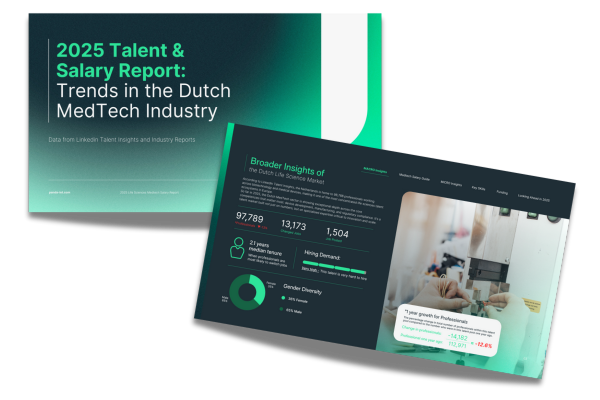In a market where top life sciences talent holds the power, interviews are no longer just assessments - they’re make-or-break moments. Drawing on her background as an organisational psychologist and recruitment advisor, Aimee shares how small shifts in interviewer behaviour can dramatically improve hiring outcomes. Discover how to turn your interviewers into Talent Champions, and why it matters now more than ever.
Insight by: Aimee Brenner, Partner and Principal Key Account Manager | Permanent Division | Q&R Specialist
If you're leading hiring in life sciences, I’m sure you already feel the shift: top candidates are choosing companies as much as companies are choosing them. What’s less obvious, but just as powerful, is this: the way your hiring managers and interviewers show up in the hiring process might be the winning factor to secure the top candidate, or the reason they quietly walk away.
Having worked in organisational psychology and change management and now as a recruitment advisor in the life sciences industry, I’ve seen both the science and the reality of this. A well-run interview can be the key to success, but a poorly executed one comes at a high cost. Too often, exceptional candidates are lost, and we seldom stop to ask why.
The Interview: A Moment of Truth
One common misconception in recruitment is that candidates turn down offers primarily because of the compensation or issues late in the process. In truth, most candidates make up their minds much earlier, often during the initial application stages and first interviews. It’s during these early interactions that they form lasting impressions about the team, the culture, and whether they can see themselves thriving in the role.
If this early experience isn’t handled well, hiring teams lose influence over the candidate’s decision. Candidates may quietly disengage, and the reasons for declining are often blamed on external factors, when in reality, the opportunity was lost much sooner.
This is backed by research: a Columbia University study found that over half of candidates have declined roles based solely on their interview experience. Similarly, Gallup’s research highlights the crucial role managers play in engagement, attributing 70% of team engagement variance to the quality of management.
This matters because today’s interviews are not just a competency check. It’s a moment of brand, belief, and emotional connection.
A New Kind of Influence
Hiring Managers and interviewers are now shaping perception as much as selection. That influence isn’t about charisma or scripts in the moment, it’s about clarity, presence, and purpose. How well they communicate the company's mission. How they treat the candidate’s time and story. Whether they create a space where curiosity, not interrogation, leads the conversation.
This is especially true in life sciences, where purpose-driven professionals are weighing not only salary and scope, but also the impact they can have. If a candidate walks away unsure how their work connects to real-world outcomes, the team’s mission or feels like a number in a rigid hiring funnel, you’ve lost them.
The Talent Advantage You Didn’t Know You Had
When interviewers are well-prepared and purpose-driven, they become strategic assets to the recruitment process. I see this first-hand every day. A great interview doesn’t just “go well” - it actively increases the likelihood that top candidates accept your offer. Here are three real-world examples I’ve seen recently:
-
A candidate accepted a role with 5% lower pay because the interview experience made them feel seen and aligned with their mission.
-
A team lost a top-tier candidate because the manager didn’t ask meaningful questions or create space for dialogue.
-
A highly qualified candidate pulled out of a hiring process because of a bad interview two years ago, and refused to reapply to the company despite a perfect-fit opportunity.
"These are small but powerful signals that shape outcomes. My role in this is to help life science organisations improve this critical step of the recruitment process. From coaching interviewers on inclusive, value-driven communication to embedding structured tools that create consistency without losing the human touch in the process."
Top Tips: How to Turn Interviewers into Talent Champions
-
Train for More Than Fit - Train to Inspire
Interviewers should be trained not only in structured evaluation but also in how to express the company’s mission and impact clearly. Life science candidates often prioritise meaningful work - make sure you connect the role to purpose. -
Set the Standard for Interview Etiquette
Small details carry weight: being on time, well-prepared, and engaged signals professionalism and respect. Every interviewer’s behaviour is a window into the organisation’s culture. -
Create Space for Two-Way Dialogue
Encourage interviewers to invite candidates to ask questions and listen actively. When candidates feel heard, they’re more likely to feel valued - and to say yes. -
Follow Up Promptly
Silence kills interest. Timely communication (even a quick update) shows respect and helps maintain momentum, especially crucial when candidates are juggling multiple offers. -
Shift from “Culture Fit” to “Culture Add”
Don’t look for clones of your current team. Instead, assess whether candidates share your values and bring complementary perspectives that can drive innovation and inclusive growth.
Final Thought
If culture drives retention, and research shows it does, then interviewers are on the front lines of shaping that culture. They aren’t just assessing candidates. They are the first real human touchpoint and the first impression of what it’s like to work in your organisation.
In a candidate-driven market, the best interviewers don’t just assess fit, they shape culture, brand and performance. And the companies that treat interview quality as a critical advantage will be the ones that don’t just fill roles, they will attract the kind of talent that transforms teams.
Reflection Questions for Hiring Leaders
-
Are your interviewers equipped to both assess and inspire?
-
How often do you gather feedback on the candidate experience?
-
What story is your team telling intentionally or not, about working in your organisation?
If any of the above gives you pause, it might be time to take a closer look at your interview tactics. I’d be happy to share what we’re seeing work across life sciences - from biotech startups to global medtech leaders.
Let’s explore where a few small shifts could make a big difference. Book a quick call here or simply send me an email below to start a conversation.

2025 Talent & Salary Report: Trends in the Dutch Medtech Industry
From rising demand in quality and regulatory roles to shifting salary expectations and candidate priorities, the second half of 2025 is shaping up to be pivotal. Our latest report unpacks how the market is evolving and where the biggest opportunities are emerging, whether you’re building your team or planning your next move.




